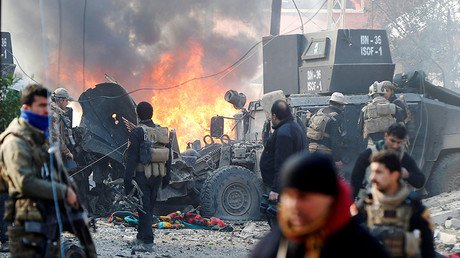No electricity or ventilation: Iraqi prison conditions for suspected ISIS militants revealed (VIDEO)
Hundreds of captured suspected Islamic State fighters are being held in extremely poor conditions by Iraqi authorities, AP reported after visiting a prison south of the recently liberated city of Mosul.
Over 370 people suspected of fighting for the Islamic State (IS, formerly ISIS/ISIL) terrorist group are currently being held at the facility.
The prison had received 1,150 detainees over the last three months, but nearly half of them have been sent to the Iraqi capital Baghdad to be investigated, the agency reported.
AP’s exclusive footage from the facility showed a crowded room with hundreds of men, some of them bare-chested and sitting on the floor.
Prison staff told AP that many of the detainees were suffering from skin diseases and other health problems.
The facility remains without electricity most of the time and lacks ventilation and windows, AP reported.
Iraqi forces have been criticized for mistreating people suspected of having links with IS during the eight-month-long battle to liberate Mosul which officially concluded on July 10.
Numerous accounts of extrajudicial executions, torture and rape were reported by the media as the operation raged on.
Last week, online videos emerged showing people in Iraqi army uniforms beating and killing men who appear to be captured Islamic State fighters.
The civilian population of Mosul paid a heavy price for the liberation of the city as months of fighting saw most of it leveled to the ground.
According to the UN, over 8,000 civilians have been killed or wounded, with 915,000 residents being forced to flee.
Many people died at the hands of IS fighters who executed those trying to escape and also used civilians as human shields.
But the US-led coalition, which is backing the Iraqi forces, has also been accused by human rights groups of excessive airstrikes and failing to protect civilian lives.
Human Rights Watch visited detention facilities near Mosul in February and documented the “horrific and inhumane” conditions there, Belkis Wille, senior Iraq researcher at HRW, told RT.
“There were rampant problems of ill-treatment, of disease. In fact, there were multiple men that were dying in detention because of the sanitary and hygiene conditions in these facilities,” she said.
Wille spoke of a 4 by 6 meters cell she visited and “114 men had been there for four months.”
“The windows have been bricked up. The temperature was almost a hundred degrees Fahrenheit. The stench was immense, with men not being allowed to shower; no bathroom besides a toilet in the room,” she said.
Such miserable detention conditions may be partially explained by the fact that Iraqi authorities lack proper facilities to host so many inmates, HRW representative said.
“Mosul has two key prisons, historically. These prisons were damaged in the fighting and so at the moment they’re holding about 2,000 men on ISIS affiliation charges in, basically, houses, makeshift facilities, local police stations that are completely unfit to hold people,” she explained.
Wille stressed that “prisoners whether or not they’ve been charged with ISIS affiliation have basic rights and they need to be moved out of these facilities as quickly as possible.”
However, she acknowledged that improving prison conditions for IS suspects “hasn’t become priority for the government and the international community.”













